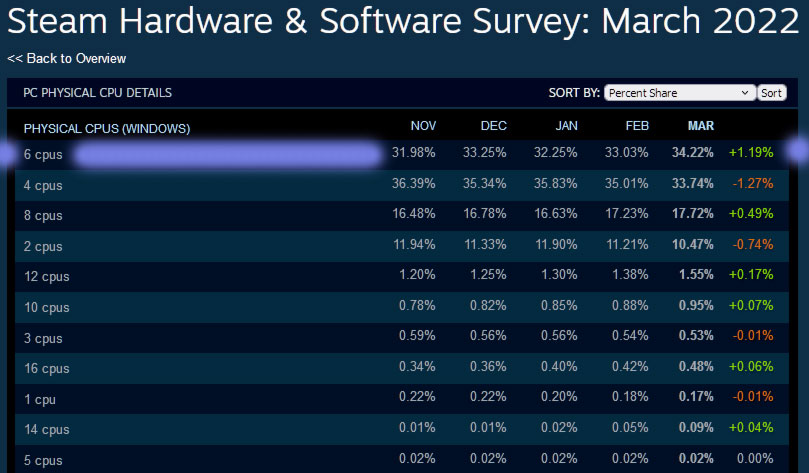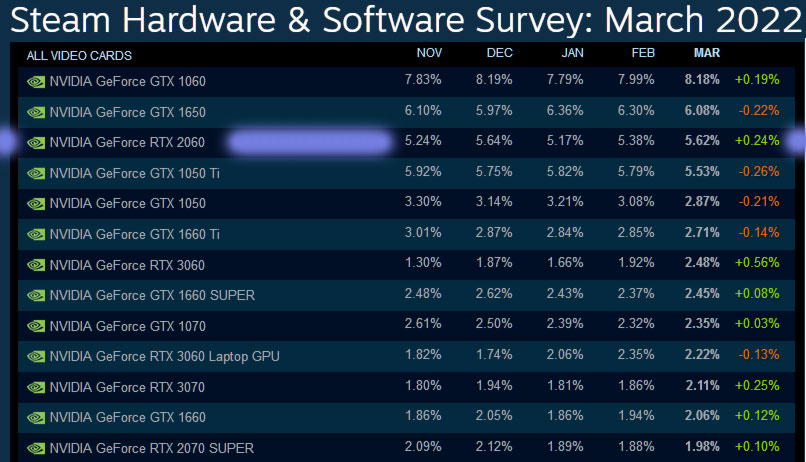Hexa-Core CPUs Reign Supreme Among Gamers On Steam
Gamers and games appreciate those extra cores.
There is plenty of action in the Steam Hardware Survey if you ponder over the most recent stats published this weekend. First, there has been a significant shift in CPU usage as hexa-core chips gain pole position for the first time, knocking quad-core parts into has-been history. Secondly, the Nvidia GeForce RTX 2060 may be attempting to reach the top of the GPU table as it moves into third place.
The latest data from the Steam Hardware Survey shows that gamers with hexa-core CPUs on this popular platform have outnumbered their quad-core brethren. Additionally, the newest data shows CPUs with six or more physical cores with 34.22% of the user base, with 33.74% of users making do with two fewer physical cores in their PCs.
The speed at which hexa-core processors have captured the top spot has been quite breathtaking. According to the archives, quad-core chips were previously dominant, with 41.61% of the Steam user share.
Elsewhere the data points to the solid performance of octa-core CPUs too, and any CPU with six or more cores has indeed grown well (except for unusual configurations like 11 core CPUs).
If you are after a mainstream CPU for gaming, you should check out our Best CPU for Gaming in 2022 guide, where you will see the overall winner, considering the price, performance, and other essential factors is the hexa-Core Intel Core i5-12600K. Meanwhile, if you want to see a significant AMD vs. Intel hexa-core fight, check out our Intel Core i5-12400 vs. AMD Ryzen 5 5600X Face-Off: The Gaming Value Showdown.


About a month ago, we reported that the Nvidia GeForce GTX 1060 had been the most popular graphics card among Steam users for years. Moreover, it had even gained some fractions of a percent at the beginning of 2022. We think this was due to the GPU finding new friends in the used market. In March, it gained again and maintained its lead with 8.18% of the market.
Why did the GeForce RTX 2060 never take over the top spot after Nvidia carefully groomed it to be the GTX 1060 successor? The answer to that probably lies in the combined horror of semiconductor shortages, Covid-19, scalping, and crypto mining – all of which worked to keep newer GPUs out of the hands of gamers for the last couple of years.
Get Tom's Hardware's best news and in-depth reviews, straight to your inbox.
In March, the RTX 2060 has climbed from fourth to third place, elbowing past the GeForce GTX 1050 Ti to gain a place on the podium. Will the RTX 2060 ever make it to the top spot? It is hard to say. This Turing architecture card is about 2.5% behind the leader, which isn't a large stretch over a half year. However, the seventh-placed Ampere GeForce RTX 3060 climbed at double the rate of the RTX 2060 in March. So perhaps the true heir to the throne will be neither of these aging 060 cards but the RTX 4060.
There are promising signs of graphics cards becoming increasingly available and more affordable. If this market environment can be maintained or improved further, the following excellent mainstream card could indeed be the GTX 1060's successor.
If you are in the market for a graphics card and want one soon, please check out our recently updated Best Graphics Cards for Gaming in 2022 guide. You should find that availability and pricing are the best for at least a year.

Mark Tyson is a news editor at Tom's Hardware. He enjoys covering the full breadth of PC tech; from business and semiconductor design to products approaching the edge of reason.
-
InvalidError Kind of shows that $200 CPUs and GPUs are mainstream kings when the market allows them to exist and provide meaningful gains over the previous $200-ish kings. The only reason the RTX2060 is creeping up is because no meaningful 50-tier GPU has been allowed to exist anywhere near its traditional price point since the 1650S.Reply -
TerryLaze Reply
Yeah or maybe for the last 2 years there was no new quad core released so people where forced to go bigger.InvalidError said:Kind of shows that $200 CPUs and GPUs are mainstream kings when the market allows them to exist and provide meaningful gains over the previous $200-ish kings. The only reason the RTX2060 is creeping up is because no meaningful 50-tier GPU has been allowed to exist anywhere near its traditional price point since the 1650S.
11th gen intel had no quad core and amd has abandoned them for even longer than that. -
InvalidError Reply
10th and 12th gen have i3s, so 11th not having one is only one year without new i3s. And people aren't forced to go up, they can still buy previous-gen, which you would likely want to do to save an extra $50-100 if you are the kind of person for whom the extra $50 or so to go from i3 to i5 is a financial hardship.TerryLaze said:Yeah or maybe for the last 2 years there was no new quad core released so people where forced to go bigger.
11th gen intel had no quad core and amd has abandoned them for even longer than that. -
TerryLaze Reply
DIY is an extremely small market and I don't know enough about how OEMs secure their stock to argue about it with you, but even if it's just one year without quads it was still one year without current gen pre builds that have quads in them and that is still going to influence these results.InvalidError said:10th and 12th gen have i3s, so 11th not having one is only one year without new i3s. And people aren't forced to go up, they can still buy previous-gen, which you would likely want to do to save an extra $50-100 if you are the kind of person for whom the extra $50 or so to go from i3 to i5 is a financial hardship. -
spongiemaster Most surprising among these results is that more than 10% of Steam users are still using dual core CPU's. I would hope most of those are laptop CPU's, but still, that is a higher percentage of gamers than I would have guessed.Reply -
InvalidError Reply
Do you know what else may have influenced the result? The 2020-2021 work-from-home boom where millions of people realized that their 5-10 years old beater PC doesn't cut it anymore and for a large chunk of them, that would have been a quad-core already. Spending $700+ to upgrade from quad to quad when $50-100 extra gets you hex with higher base clocks and more cache doesn't sound particularly good.TerryLaze said:DIY is an extremely small market and I don't know enough about how OEMs secure their stock to argue about it with you, but even if it's just one year without quads it was still one year without current gen pre builds that have quads in them and that is still going to influence these results.
I suspect the lion's share of (1024-1366)x(768-800) primary monitor resolutions are old laptops, so 6-7% out of 11% dual cores.spongiemaster said:Most surprising among these results is that more than 10% of Steam users are still using dual core CPU's. I would hope most of those are laptop CPU's, but still, that is a higher percentage of gamers than I would have guessed.